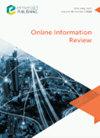Using online English learning resources: utilitarian and hedonic perspectives
IF 3.1
3区 管理学
Q2 COMPUTER SCIENCE, INFORMATION SYSTEMS
引用次数: 0
Abstract
PurposeThis study intended to identify and categorize the drivers of using online English learning resources (OELR) and to understand OELR's impacts.Design/methodology/approachThe authors conducted an online survey, obtained complete responses from 157 OELR users and used structural equation modeling (SEM) for hypothesis testing.FindingsMost utilitarian and hedonic drivers lead to positive perceptions of OELR, which in turn positively contribute to continuance intention (CI). Two counterintuitive findings were obtained. First, functionality was negatively related to the perception of ease of use. Second, perceived ease of use (PEOU) was not related to CI to use OELR.Practical implicationsThis study has implications as follows: (1) complexity of the functions of OELR may deter rather than attract users, (2) ease of use of OELR is not directly positively related to CIs and (3) users may seek practical benefits (utilitarian) and experiential learning processes (hedonic) when using OELR.Originality/valueThe authors' study has theoretical significance by being the first to caution that excessive functionality or complexity in assisting learning tools would likely hinder further use of OELR. The practical significance of this finding is that the finding highlights two factors (perceived usefulness (PU) and perceived enjoyment) that could effectively increase OELR use.利用在线英语学习资源:功利主义和享乐主义的视角
目的本研究旨在识别和分类使用在线英语学习资源(OELR)的驱动因素,并了解OELR的影响。设计/方法/方法作者进行了一项在线调查,获得了157名OELR用户的完整回复,并使用结构方程模型(SEM)进行假设检验。大多数功利主义和享乐主义驱动因素导致对OELR的积极认知,这反过来又积极地促进了继续意愿(CI)。得到了两个违反直觉的发现。首先,功能与易用性的感知呈负相关。其次,感知易用性(PEOU)与使用OELR的CI无关。本研究的启示如下:(1)OELR功能的复杂性可能会阻碍而不是吸引用户,(2)OELR的易用性与ci没有直接正相关,(3)用户在使用OELR时可能会寻求实际利益(功利主义)和体验学习过程(享乐主义)。原创性/价值作者的研究具有理论意义,因为他们首次警告说,辅助学习工具的过度功能或复杂性可能会阻碍OELR的进一步使用。这一发现的实际意义在于,该发现突出了两个因素(感知有用性(PU)和感知享受),可以有效地增加OELR的使用。
本文章由计算机程序翻译,如有差异,请以英文原文为准。
求助全文
约1分钟内获得全文
求助全文
来源期刊

Online Information Review
工程技术-计算机:信息系统
CiteScore
6.90
自引率
16.10%
发文量
67
审稿时长
6 months
期刊介绍:
The journal provides a multi-disciplinary forum for scholars from a range of fields, including information studies/iSchools, data studies, internet studies, media and communication studies and information systems.
Publishes research on the social, political and ethical aspects of emergent digital information practices and platforms, and welcomes submissions that draw upon critical and socio-technical perspectives in order to address these developments.
Welcomes empirical, conceptual and methodological contributions on any topics relevant to the broad field of digital information and communication, however we are particularly interested in receiving submissions that address emerging issues around the below topics.
Coverage includes (but is not limited to):
•Online communities, social networking and social media, including online political communication; crowdsourcing; positive computing and wellbeing.
•The social drivers and implications of emerging data practices, including open data; big data; data journeys and flows; and research data management.
•Digital transformations including organisations’ use of information technologies (e.g. Internet of Things and digitisation of user experience) to improve economic and social welfare, health and wellbeing, and protect the environment.
•Developments in digital scholarship and the production and use of scholarly content.
•Online and digital research methods, including their ethical aspects.
 求助内容:
求助内容: 应助结果提醒方式:
应助结果提醒方式:


